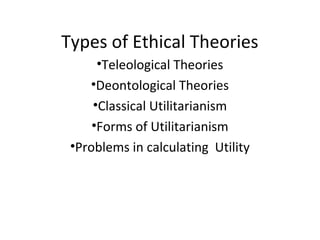
Types of Ethical Theories Explained
- 1. Types of Ethical Theories •Teleological Theories •Deontological Theories •Classical Utilitarianism •Forms of Utilitarianism •Problems in calculating Utility
- 2. Introduction • There are three major theories, based on our beliefs about moral obligations, rights, and justice and they are applied in a number of issues concerning rights and obligations of employees, employee relations, protection of employees and consumers and the responsibility of corporation to the firm at large. • There are major disagreement in the content and application of these theories.
- 3. TYPES OF Ethical Theories •Teleological •Deontological •Virtue(Aristotle)
- 4. Teleological • Rightness of action is determined solely by the amount of good consequences they produce. • The word is derived from the Greek word telos which refers to an end. • Action is justified by the ‘end’ it achieves rather than the features of the action. • According to utilitarianism, our obligation or duty, in any situation is to perform the action that will result in the greatest possible balance of good over evil. Whatever makes human beings better off is good. • Obviously it depends on what is considered as ‘good’ or ‘evil’ or ‘pleasure’ or ‘pain’. • It depends on person’s own conception.
- 5. Strengths: 1. They agree to much of our moral reasoning 2. Teleological theories provide relatively precise and objective method for moral decision making. E.g. Goodness of consequences can be measured and compared. Weaknesses 1. Ordinarily our moral reasoning is teleological, but some are non-teleological. 2. We have an obligation to keep our promise. Example: If we promise to store food for a person, it would be wrong to give it away to hungry beggars, because it would have better consequences.
- 6. Role Obligations, Rights, and Justice. • Role obligations, which occupy prominent place in business, often seem to be non teleological. Parents have obligation to their children, is created by special relationship of parenthood. There is nothing wrong for parents providing for their children, when money could be better spent on donation to an orphanage. • Rights to free speech may entitle us to speak freely— even when restricting this might produce better consequences. • Similarly, discrimination against women or children could produce better consequences, discrimination is a violation of basic principles of justice.
- 7. Deontological Theories. • It holds that certain actions are not right and consequences do not determine what we ought to do.It contains set of absolute morals( WD Ross): 1. Duties of fidelity-to keep promises 2. Duties of reparation- To compensate for injuries 3. Duties of gratitude- return favours 4. Duties of justice- to distribute goods according to people’s merits or deserts. 5. Duties of beneficence- to do whatever to improve conditions of others. 6. Duties of self-improvement- To improve our own condition with respect to virtue and intelligence 7. Duties of nonmaleficence-To avoid injuries to others.
- 8. Strengths and Weaknesses Strengths: • Justifies obligations irrespective of consequences- justifying obligations arising out of relationships. E.g. manufacturer honouring a warranty. • It account for role of motive; Two people give large amounts to charity– one for genuine reason and the other for impressing people. Weaknesses : • How to know our moral obligation? • No reason offered to accept these rules. • People at different times and different places may reject Ross’s Rules
- 9. Forms of Utilitarianism An action is right if and if only it produces the greatest balance of pleasure over pin for everyone. So stated utilitarian principle invonves four distinct thesis: 1. Consequentialism- 2. Hedonism(Bentham)- Pleasure in absence of pain. 3. Maximalism - A right action is one that has not merely some good consequences, but the greatest amount of good consequences. 4. Universalism- The consequences to be considered are those of everyone.
- 10. Act-and Rule- Utilitarianism • It is judged by virtue of the consequences. If telling a lie or breaking a promise leads to better consequences, it may be better! • Two versions of Act Uttiltarianism: AU- An action is right if and if only it produces the greatest pleasure over pain to everyone. RU- An action is right and only right if it conforms to set of rules the general acceptance of which would produce the greatest balance of pleasure over pain for everyone.
- 11. Problems of calculating Utility. • The amount of Utility-Balance of pleasure over pain to individual • To society?!? • Interpersonal comparison of utility between two people who attended a concert to find out who enjoyed more. • The problem of quantifying or assigning monitory value.
- 12. Cost-benefit Analysis. • Differs from Bentham’s hedonistic calculus primarily because it uses monitory units for measuring utility • From economic point of view, it is means for efficient achieving efficient allocation of resources. • It is basing business decisions based on returns on investments. • Chief advantage-price of many goods are set by the market so that the need to have knowledge of people’s pleasures or preferences are largely ignored. • In cost-effectiveness analysis we assume that we have some agreed upon ends while in cost-benefit analysis both the means and the ends are selected to come to a decision. • Cost -benefit analysis is a reply to any theory which is value-laden.
- 13. Conclusion • Utilitarianism is a powerful and widely accepted ethical theory that has special relevance to problems in business. • It allows us to justify many of the obligations of individuals and corporations. • It provides a strong foundation for rights and justice. • It provides a relatively firm and coherent basis for business ethics.
Notas del editor
- P33.
- p38
- p.38
- P45 Conclusion